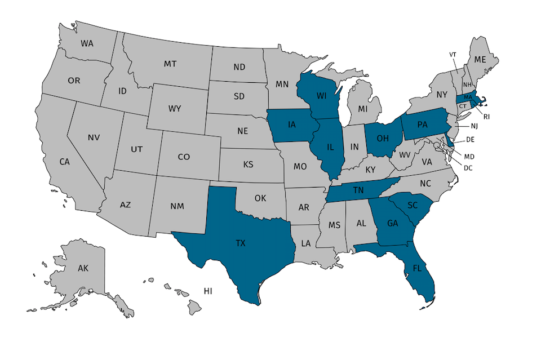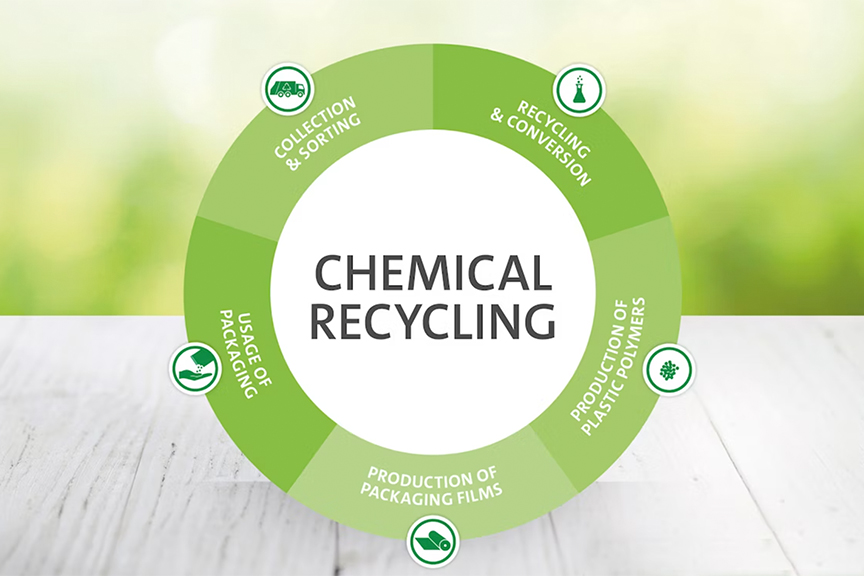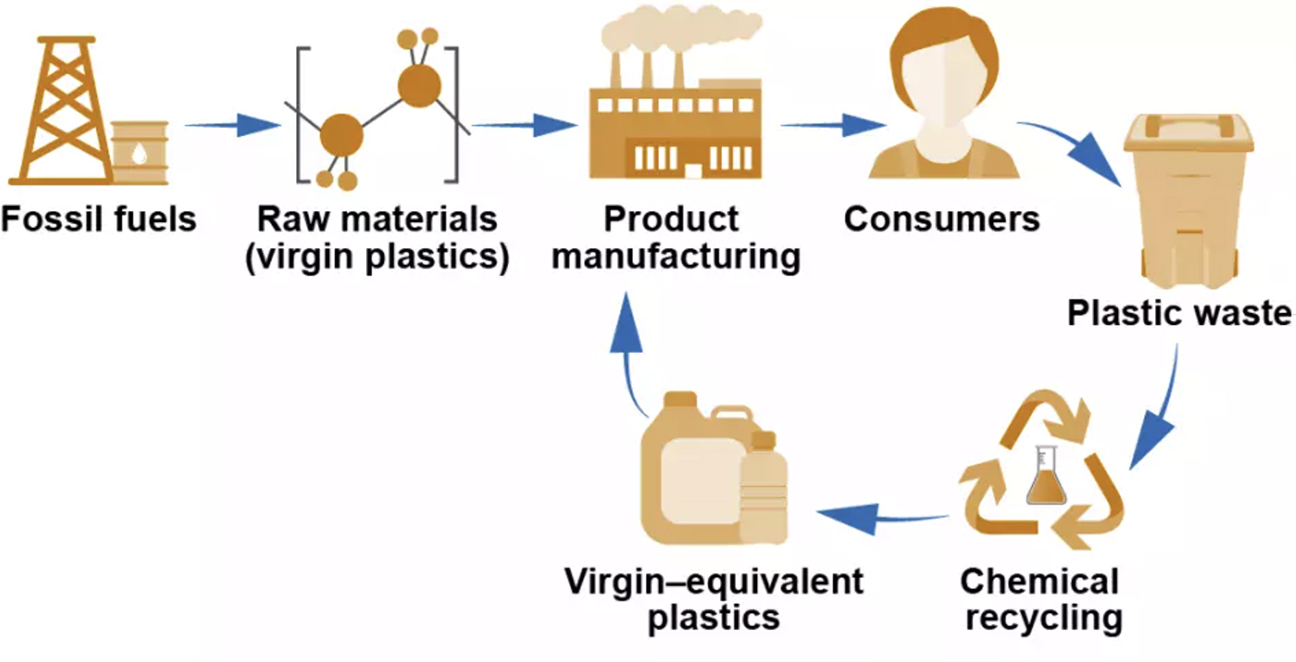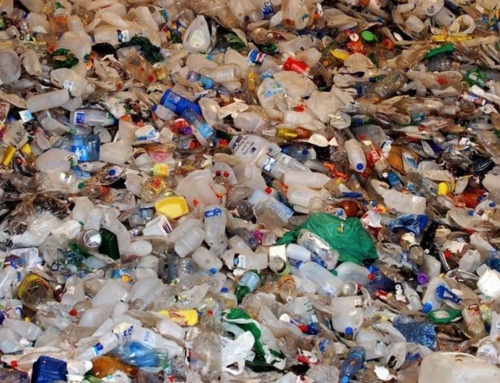Recent discussions on recycling have placed chemical recycling at the forefront, a focal point mirrored in state legislatures across the country.
Over the past few years, 24 states have introduced bills categorizing chemical recycling as a form of manufacturing rather than waste management. This distinction holds significant implications, as waste management facilities are subject to more stringent environmental regulations.
Several other states have attempted to pass laws clarifying that the act should be subject to waste management regulations, even when the materials processed by this method don’t contribute to state-defined recycling goals.
Proponents within the industry argue that this classification reduces barriers for an innovative technology and more accurately characterizes the processes taking place in their facilities. Conversely, environmentalists who oppose this classification argue for subjecting such facilities to higher environmental standards.
The term “chemical recycling,” also known as “advanced recycling,” broadly encompasses various processes that utilize heat, pressure, and solvents to break down polymer molecular chains into liquids or gases. These byproducts can then be refined into fuels, oils, waxes, new plastics, or other chemical products.
Craig Cookson, Senior Director of Plastics Sustainability at the American Chemistry Council (ACC), predicts that more states will classify it as a form of manufacturing in the years to come. He emphasizes the importance of advanced recycling to help meet the increasing demand for recycling various types of plastics, especially for packaging materials like pouches and films.
Kate Donovan, a Senior Attorney with the Natural Resource Defense Council, advocates for a reduction in plastic usage and alternative reuse methods instead of chemically recycling materials into fuels or more plastics. In New York, her organization seeks to prevent such facilities from establishing operations altogether. However, if they do operate, she insists that they should be subject to stringent regulations, akin to waste management standards.
Donovan expresses concerns about the environmental impact of chemical recycling, citing the use and production of toxic and hazardous substances in the process. She highlights that these facilities are often located in environmental justice communities, which have historically borne the brunt of pollution burdens.
Anja Brandon, Associate Director of U.S. Plastics Policy at Ocean Conservancy, has raised questions about the industry’s push to classify the act as manufacturing rather than waste management. She suggests that this move aims to circumvent environmental permitting requirements. Ocean Conservancy does not endorse any form of chemical type recycling, citing concerns about its environmental and social impacts, which they view as inconsistent with the goal of creating a healthier ocean and a more just world.
In the evolving landscape of recycling regulation, the classification plays a pivotal role in shaping the future of recycling practices in the United States.

Legislation in 2023: A State-by-State Overview
The year 2023 witnessed a flurry of legislative activity across the United States, with 15 bills introduced addressing various aspects of the process. These bills spanned a spectrum of definitions and regulations, reflecting the diverse approaches states have taken to address this emerging industry.
Of the 15 bills introduced, a clear majority, 13 in total, aimed to define chemical recycling as a form of manufacturing. These states sought to align their regulatory frameworks with this classification. Notably, New Hampshire, in a reversal of its 2022 stance, introduced legislation to overturn its prior decision to regulate it as manufacturing.
Meanwhile, Maine’s LD 1660 faced an uncertain fate, remaining stalled in the Committee on Environmental and Natural Resources. This bill proposed categorizing chemical recycling facilities under solid waste regulations and explicitly stated that chemical recycling should not be considered a form of recycling.
In New Hampshire, SB 267 was a point of contention. Initially, it aimed to establish specific rules for chemical recycling facilities, considering their nascent and untested nature and the potential for pollutant production. However, the Senate later amended the bill, shifting its focus towards requiring the Commissioner of the Department of Environmental Services to conduct a “cumulative impacts analysis” in all future rules and statutes.
Five bills successfully became law, further shaping the regulatory landscape for chemical recycling. Indiana (SB 472), Kansas (SB 114), and Utah (HB 493) enacted nearly identical laws to regulate chemical recycling as manufacturing. In Texas (HB 3060) and Louisiana (SB 100), laws were updated to ensure that products resulting from chemical recycling would contribute to future recycled-content mandates, thereby classifying chemical recycling as a valid form of recycling.
Craig Cookson, Senior Director of Plastics Sustainability at the American Chemistry Council (ACC), noted the positive momentum these legislative actions represented for the industry. ACC has actively countered opposition to these regulations with comprehensive research and information, emphasizing the facilities’ lower emissions and compliance with various environmental regulations.
In addition to disseminating information, ACC facilitates visits to these facilities by lawmakers and other stakeholders, providing firsthand experiences of their operations.
While seven bills failed to advance, including one in Maine, the discussions around chemical recycling continue in states such as Alabama (HB 36), Alaska (AB 143), Nebraska (LB 599), Nevada (SB 361), New York (AB 4744), and Virginia (SB 1365). These states are grappling with the complexities surrounding the regulation of chemical recycling.
The debate remains active in three states, with New Hampshire, New Jersey, and North Carolina all considering bills to regulate chemical recycling as a form of manufacturing. As the year unfolds, these states, like many others, continue to shape the future of chemical recycling through legislative action.
Legislating Progress: The Path Forward for Chemical Recycling
The American Chemistry Council (ACC) has been a prominent advocate for the classification of chemical recycling as manufacturing, a stance that has gained traction in state legislatures across the nation. According to Craig Cookson, Senior Director of Plastics Sustainability at ACC, this classification aligns with the nature of the processes occurring within these facilities.
Cookson emphasizes that chemical recycling facilities do not handle solid waste but rather receive sorted plastics, subsequently breaking them down into their fundamental chemical components. The end product, a liquid commodity, serves as an alternative to raw materials, oil, and gas, making it inherently a form of manufacturing. As such, regulating these facilities under manufacturing laws is both logical and appropriate.
ACC actively supports bills, such as those in Texas and Louisiana, that recognize chemical recycling as contributing to recycling goals and targets. This effort reflects the broader shift toward extended producer responsibility and recycled content mandates. The aim is to ensure that materials processed through advanced recycling facilities count as recycling, thereby promoting the adoption of these technologies.
Cookson anticipates that a similar trend may emerge at the federal level in the future, with the development of a national regulatory framework. Such a framework would position the United States as a global leader in advanced recycling technologies, encompassing both chemical and mechanical recycling.
However, there has also been opposition to chemical recycling at the federal level. The Break Free From Plastic Pollution Act has proposed additional permitting requirements for chemical recycling facilities and does not classify the process as recycling. Furthermore, a letter from 35 members of Congress to the U.S. Environmental Protection Agency (EPA) in July 2022 urged the department to continue regulating chemical recycling as combustion, rather than manufacturing, under the Clean Air Act.
In response, the EPA, in May 2023, chose to maintain existing Clean Air Act requirements for pyrolysis, citing concerns about toxic emissions from these facilities. The plastic and petrochemical industry’s lobbying efforts at the state level, aimed at reducing emission control requirements for incinerators using chemical recycling technologies, were also mentioned.
Lynn Hoffman, co-president of Eureka Recycling, raises questions about the need for codifying chemical recycling under state law. She contends that these facilities are, by any definition, manufacturers when they take separated plastics to create new products. However, she acknowledges the wide umbrella term “chemical recycling,” encompassing various unproven technologies, and calls for a focus on innovations that enhance mechanical recycling.







